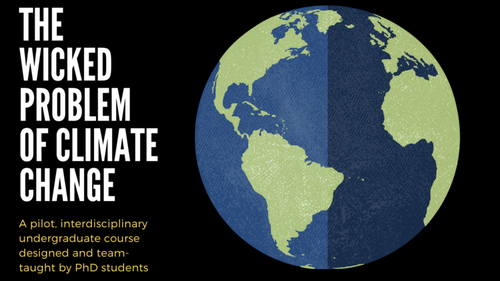
Wicked problems require collaborative solutions
Interdisciplinary course on climate change open to undergraduate students

Interdisciplinary course on climate change open to undergraduate students
By Jon Parsons University RelationsA new pilot course on climate change is bringing together unique perspectives from across Waterloo’s faculties and inviting senior undergraduate students to register.
The course, called The Wicked Problem of Climate Change, is being taught by six PhD students, one from each of the University’s six faculties, to understand the multifaceted issues that make up the climate emergency.
“We know that interdisciplinary learning and teaching are key to helping us understand complex problems,” says Dr. Anna Esselment, associate dean of graduate studies for the Faculty of Arts and an associate professor in the Department of Political Science. “This is a truly unique upper-year course that will bring together a community of undergraduate students from across the University to understand the impact and outcomes of climate change through different lenses.”
The pilot course is being offered in Winter 2023 with an enrolment of up to 60 students — 10 from each faculty. The six PhD researchers who are teaching the course have been developing it through the Beta Teaching Innovation Incubator, an initiative stemming from the University’s strategic plan and partnered with Waterloo’s Centre for Teaching Excellence.

PhD students, one from each of the University's six faculties, in an ideation and course design session. The unique interdisciplinary course, titled The Wicked Problem of Climate Change, is being co-taught by six students: Donovan Allum of the Faculty of Mathematics; Débora Andrade-Pereira of the Faculty of Science; Shehryar Khan of the Faculty of Engineering; Shahan Salim of the Faculty of Health; Jerika Sanderson of the Faculty of Arts; and Kayleigh Swanson of the Faculty of Environment.
“The challenging part about teaching a complete course about addressing climate change is that it requires people who normally don’t communicate with each other to do just that,” says Donovan Allum, a PhD student in the Department of Applied Mathematics and one of the six developing the course. “We expect students to come to class with a diverse set of perspectives based on a combination of their academic and personal backgrounds.”
For example, an arts perspective on climate change may explore responses to climate change in literature and popular culture, as well as strategies for identifying and addressing climate change misinformation, whereas an engineering perspective on climate change may bring up issues related to any technical capacities to minimize CO2 emissions or build resilient infrastructure.
Similarly, perspectives from health and biology may focus on the ramifications of an already-changing climate on the proliferation of infectious diseases and pest invasions, whereas a mathematical perspective may focus on issues related to global climate models and what can be learned from computer simulations of possible future scenarios.

The new course is open to senior undergraduate students and is an initiative of Graduate Studies and Postdoctoral Affairs. It was developed with the support of the Beta Teaching Innovation Incubator through Waterloo's Centre for Teaching Excellence.
“Our goal through this interdisciplinary course is to give students opportunities for conversations and collaborations across disciplines so that they will gain insight from new perspectives,” says Jerika Sanderson, a PhD student in the Department of English Language and Literature.
Debora Andrade-Pereira, a PhD student in the Department of Biology, adds that “by challenging students to reflect on the roles and limitations of science for understanding the fundamentals of climate change, predicting impacts, proposing solutions and dialoguing with traditional knowledge, we will encourage students to develop their own stance on the Wicked Problem of Climate Change.”
Graduate Studies and Postdoctoral Affairs (GSPA) is looking to develop further Wicked Problems courses that take up other key issues facing Canada and the world. For now, the pilot course on climate change is inviting undergraduate students to register. More details about the course are available on the Wicked Problem of Climate Change webpage.

Read more
Dr. Chris Fletcher is part of a scientific consortium developing satellite technology to better understand climate change

Read more
PhD student Fraser King brings computer science to study of precipitation

Read more
Political scientist Daniel Henstra spoke to AMO on how Ontario municipalities can prepare for climate impacts
The University of Waterloo acknowledges that much of our work takes place on the traditional territory of the Neutral, Anishinaabeg, and Haudenosaunee peoples. Our main campus is situated on the Haldimand Tract, the land granted to the Six Nations that includes six miles on each side of the Grand River. Our active work toward reconciliation takes place across our campuses through research, learning, teaching, and community building, and is co-ordinated within the Office of Indigenous Relations.